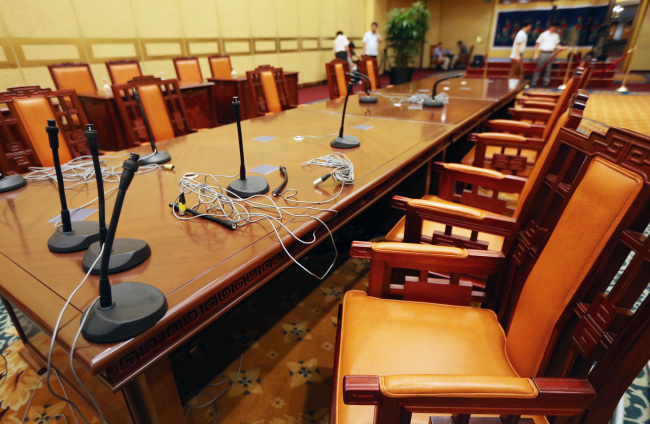Koreas cancel talks at last minute
Two sides clash over level of chief delegates, blame each other for scuttled meeting
By 윤민식Published : June 11, 2013 - 19:52

The two Koreas on Tuesday evening canceled their planned meeting due to irreconcilable differences over the level of their delegations.
The cancellation, just one day before the opening of what would have been the first high-level government talks since 2007, is expected to deal a blow on the resurgent mood for reconciliation.
The two-day meeting was to be held in Seoul to discuss the resumptions of the joint industrial park in Gaeseong, tours to Mount Geumgang and reunions of separated families, and other pending issues.
“North Korea announced that its delegation will not be sent, making an issue out of the level of our chief negotiator,” Unification Ministry spokesman Kim Hyung-suk told reporters.
He added that the lists of each side’s five-member delegation were exchanged at 1 p.m.
“Immediately after the lists were exchanged, the North raised an issue about the head of our delegation, saying that the talks cannot be held unless a minister-level official leads our side.”
The two sides exchanged barbs, blaming each other for the cancellation.
“The government deeply regrets North’s attitude. It makes no sense for the North to reject the inter-Korean governmental talks due to the level of our delegation,” Kim said.
He cited the North as saying the South’s change of delegation is a provocation.
Seoul had chosen Vice Unification Minister Kim Nam-sik to head the delegation after North Korea rejected its suggestion of holding the talks between minister-level officials.
South Korea’s first choice to lead the delegation was Unification Minister Ryoo Kihl-jae, but the change was made after North Korea implied during the working-level talks that were concluded on Monday that Kim Yang-gon, head of the North’s United Front Department of the ruling Workers’ Party of Korea, would not be heading its delegation.
The North’s delegation was to be led by Kang Ji-yong, an official at the Committee for the Peaceful Reunification of the Fatherland, whom Pyongyang claimed is an “upper-level” official. According to Seoul, however, Kang’s post within the Committee for the Peaceful Reunification of the Fatherland is significantly lower than that of a minister.
The two-day meeting came as the South seeks to kick-start its trust-building drive while the North is striving to mitigate international pressure over its nuclear program.
The Park Geun-hye government had planned to approach lighter issues including humanitarian ones before moving on to tougher issues such as security as part of its step-by-step trust-building process.
But Pyongyang was expected to seek to deal with a comprehensive range of issues including jointly hosting the events to mark the June 15 inter-Korean declaration signed in 2000 and the July 4 joint statement signed in 1972, and exchanging civilians.
The focus of the talks was expected to be on reviving bilateral economic cooperation that virtually ended after the suspension of the Gaeseong industrial complex in April. The so-called May 24 measures, put in place after the North’s torpedoing of the corvette Cheonan in March 2010, had also seriously diminished bilateral cooperation.
For the cash-strapped North, reactivating the factory park is critical as it seeks to shore up the moribund economy and address chronic food shortages which could add to public anger over the fledgling Kim Jong-un regime.
The Gaeseong complex was a vital source of hard foreign currency for the regime, which has been put under deeper international isolation following its nuclear test in February and long-range rocket launch in December.
For its part, Seoul was expected to demand that Pyongyang sign a legally binding commitment for it to be held responsible should it unilaterally suspend the operation of the industrial park where 123 South Korean firms had run its labor-intensive factories.
The resumption of the tours to the mountain resort off the North’s east coast is a more complicated issue as Seoul has sought to secure Pyongyang’s guarantee to ensure the safety of tourists.
By Song Sang-ho and Choi He-suk
(sshluck@heraldcorp.com)
(cheesuk@heraldcorp.com)










![[Hello India] Hyundai Motor vows to boost 'clean mobility' in India](http://res.heraldm.com/phpwas/restmb_idxmake.php?idx=644&simg=/content/image/2024/04/25/20240425050672_0.jpg&u=)








